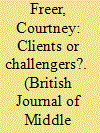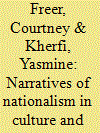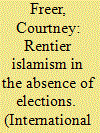|
|
|
Sort Order |
|
|
|
Items / Page
|
|
|
|
|
|
|
| Srl | Item |
| 1 |
ID:
179794


|
|
|
|
|
| Summary/Abstract |
Traditional understandings of Middle Eastern politics place tribes as critical supporters of ruling families; this dynamic is considered particularly strong within the smaller Gulf states, which are oftentimes even referred to as ‘bedouinocracies’. While tribes undoubtedly hold political capital throughout the Middle East, it is uncertain to what extent they remain clients of Gulf regimes or are in fact independent, and potentially oppositional, actors. This paper examines electoral outcomes for the Kuwaiti legislature, Qatari municipal council, and Emirati consultative council to understand the extent to which major tribal groups take collective action through electoral campaigns.
|
|
|
|
|
|
|
|
|
|
|
|
|
|
|
|
| 2 |
ID:
158060


|
|
|
|
|
| Summary/Abstract |
While considerable existing scholarship examines the degree to which Muslim Brotherhood affiliates have toned down their religious rhetoric to compete in electoral politics, very little of that discussion centres on how Brotherhood movements react when political space narrows. Even fewer studies have examined the recent behaviour of the Brotherhood affiliate in Kuwait. In this article, we demonstrate how the Kuwaiti Muslim Brotherhood has, in the face of increased government surveillance and restriction of political space, moderated its Islamist agenda to become part of the broader opposition agitating for structural political reforms, often at the expense of the traditional agenda of Islamizing society.
|
|
|
|
|
|
|
|
|
|
|
|
|
|
|
|
| 3 |
ID:
179804


|
|
|
|
|
| Summary/Abstract |
Arabian Peninsula politics are in a period of enormous transformation. In the context of a new generation of rulers seeking legitimacy through ambitious foreign policy regimes, shifting relations with Iran, the 2017–2021 Qatar crisis, and ongoing conflict in Yemen, this article introduces the July 2021 special section of International Affairs, which examines how the Arab states of the Gulf are adapting to these new realities. Questions addressed include: how have transnational identities been manipulated by states during regional disputes? How have oil and gas revenues been redirected to build up religious soft power and enhance state branding efforts? In an increasingly authoritarian world, how has transnational repression interacted with politicized diasporas to impact opposition mobilization? And, how do disputes over airspace help us understand the process of sovereignty-building in the modern Middle East? In pursuing these questions, the special section challenges the particularism still apparent in many analyses of the Gulf region, and seeks to bridge International Relations with fieldwork-based Gulf studies. The research presented in the section highlights new findings within contemporary research on the Gulf that will be of interest both to policy-makers and others seeking to understand the long-term sustainability and balance of power in this critical region.
|
|
|
|
|
|
|
|
|
|
|
|
|
|
|
|
| 4 |
ID:
185810


|
|
|
|
|
| Summary/Abstract |
Sylvia Kedourie, in a 1955 piece, analysed the ideological point of contact between Arab nationalism and Islam, in so doing highlighting the distinctions between watan and umma in linguistic patterns and ideological significance. In this piece, using the starting point of Kedourie's prescient examination, I trace the ways in which such a linguistic shift from umma to watan has followed a broader pattern towards the localization of Islamist factions, perhaps best illustrated by the example of the Muslim Brotherhood in the Arabian Peninsula.
|
|
|
|
|
|
|
|
|
|
|
|
|
|
|
|
| 5 |
ID:
177278


|
|
|
|
|
| Summary/Abstract |
Over the past decade, all six states of the Gulf Cooperation Council (GCC) have invested considerably in the development of their local heritage industries. In parallel, these states have expanded their efforts at fostering home-grown nationalism. What scholarship exists on the topic of expansion of the heritage industry tends to be anthropological, sociological, or linked to museum studies, while literature on nationalism tends to remain in the realm of political science. This article addresses disciplinary gaps by taking special account of the state’s role in producing heritage and culture to foster nationalism. This development has been neglected or taken for granted in past studies of heritage production and preservation in the Gulf, and therefore deserves more substantial academic inquiry. In the first part of this article, we assess ways in which the Arabian Peninsula provides a unique environment for the study of heritage sites, before looking at how different actors, including grassroots initiatives and more substantially the state, engage in heritage production to promote select narratives about citizens’ shared history and common identity. In so doing, this piece offers a critical reflection on the ongoing processes through which heritage-making, political power, and nation-building are uniquely intertwined in the GCC.
|
|
|
|
|
|
|
|
|
|
|
|
|
|
|
|
| 6 |
ID:
154660


|
|
|
|
|
| Summary/Abstract |
Drawing on contemporary history and empirical research, this article revises traditional rentier state theory, which fails to account for the existence of Islamist movements in states accruing substantial outside wealth. Rentier state theory expects that citizens of such states will form opposition blocs only when their stake in rent income is threatened. Examining the development of Muslim Brotherhood affiliates in two archetypal rentier states, or super-rentiers, in the Gulf—Qatar and the United Arab Emirates—this article shows that ideology rather than rent motivated the formation of independent Islamist movements. This research helps to break the causal link established by rentier state theory between oil rents and lack of politically relevant Islamist organizations. We find that the presence of oil rents, instead of rendering Islamist complaint politically irrelevant, shapes the ways in which Islamist movements seek to influence government policies.
|
|
|
|
|
|
|
|
|
|
|
|
|
|
|
|
| 7 |
ID:
171900


|
|
|
|
|
| Summary/Abstract |
This paper aims to theorize the relationship between religion and rentierism. Existing literature on rentier states of the Gulf Cooperation Council (GCC) focuses on the means by which oil rents facilitate economic and political co-optation while failing to address co-optation of the religious sector, which is arguably as important for government maintenance of social and political legitimacy. In this paper, which focuses on the post-2011 era, we assess the existing literature on this topic in order to identify important gaps, before assessing the means and mechanisms, as well as the comparative efficacy, of religious control across the six states of the GCC. We then draw conclusions about the ways in which control of rentier-funded religious institutions reflects the degree of political control exerted by governments in these countries more broadly, as well as how levels of rentier wealth can dictate the level of control over religious life. Specifically, we identify a trend towards greater centralization of control of the religious sphere and of political life in Bahrain, Oman, Saudi Arabia, and the United Arab Emirates (UAE), with a tendency towards co-optation in Kuwait and Qatar.
|
|
|
|
|
|
|
|
|
|
|
|
|
|
|
|
|
|
|
|
|